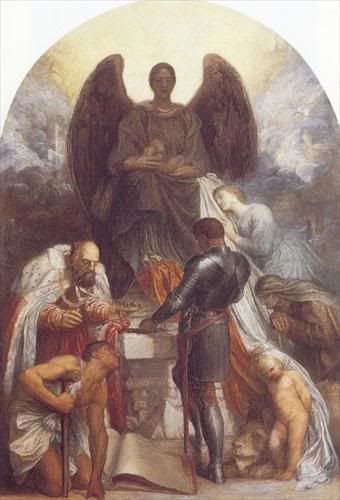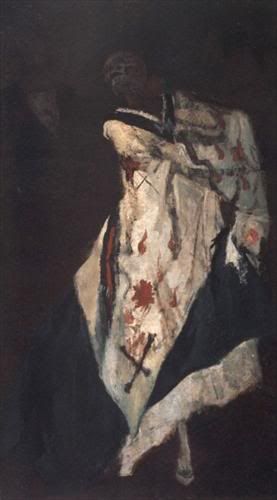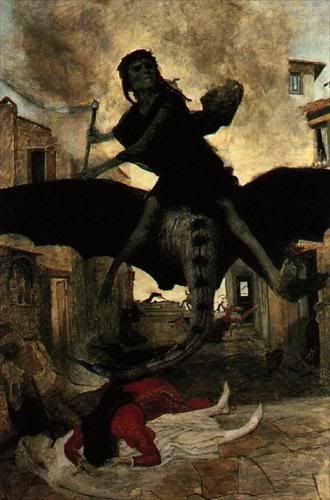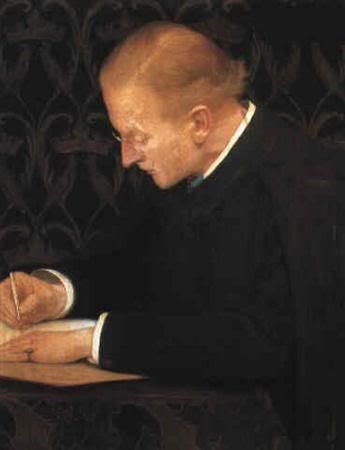Why I Began the End
Maia Jacomus

It was funny for maybe the first four days. Then it declined into banality.
Every time I entered that meadhouse, nearly every Aesir would be there, laughing and throwing whatever they could grab at Baldur. The Shining Boy himself would just sit at his usual table, drinking a pint of mead, every now and then forcing a chuckle to pretend he was alright with things constantly barraging him. He was a bright lad; had a lot of interesting things to say, when given the chance. But rising to speak to someone would only present more of a target, and before he could get even two words out, a sword blade would ricochet off him, fly across the room, and strike the doorframe. I’d asked his mother Frigg about it one day. Of course, I knew she would never tell
me anything, so I changed myself into an old woman.
“You certainly have a hale son,” I said, my voice cracking. “How does he stay so strong and healthy?”
Frigg smiled with that motherly pride and said, “I worried about him when he was born, so I went all over the world and asked everything in turn to vow not to harm him.”
“Gracious, what a task! Everything?”
She nodded. “Everything.”
“The thunderbolt and the thistle? And plague and disease, too?”
“Of course.” She shrugged slightly. “Well, I did not make the mistletoe vow. It is too young to understand what I was asking of it. But we have no reason to fear the mistletoe.”
* * * I used to talk with him. I’d wait for an opening in the shower of projectiles and jump to a seat next to him. “Loki,” he’d say to me, “thank you on behalf on my sanity.” But too many aims for him have struck me, and no object in all of Yggdrasil would vow not to harm me, even by Freyja’s appeal. So I mostly hung on the doorway, a literal fly on the wall as the Aesir find constant amusement in hurling various implements at Odin’s son.
I had a scheme one day. You see, the one event that was the highlight of this idiocy was when Thor would come in with his hammer—excuse me, Mjolnir (What kind of a jerk
names a hammer, anyway?)—and hurl it at Baldur, and it would strike the boy without a flinch. Baldur’s told me he could tell when Thor threw his hammer at him—not because he really felt it, but because that’s when the laughter in the room would erupt to its fullest. At first, my scheme was just a musing that came to mind while watching the senseless act; I thought
How hilarious would it be for Thor to reach for his hammer to chuck at Baldur, only to find that it was gone. I bet the whole room would fall dead silent, and Thor’s cow-face would turn purple. It made me laugh to think of it; the first time in a long time my laughter rang in that room. But then I realized that it could just be the perfect solution—Thor may accuse anyone or everyone in the room of being the thief; no one would show their face in that meadhouse until the Thunder God was satiated again. Baldur could finally have some peace, and I could have a fine joke.
The execution was difficult. I only had between the time that Thor entered until the time he sat down to steal the hammer, and not just to prevent his throwing the thing, but also because he would usually have the hammer shrink to fit in his tunic pocket; no way I’d be able to lift the Crusher in its full size. I began as a mouse. To save time, I climbed up and sat myself on the inside door handle, so that when Thor swung open the door and shut it closed behind him—me with a death grip on the handle so I didn’t fly off—I jumped from the handle and grabbed hold of his belt. Hanging off his belt, I sidled over and swung into his tunic pocket, hitting my nose on the hammer. I opened my little rat mouth as wide as I could and clamped onto the hammer’s pommel, pulling it out of the pocket. I fell to the floor, the then-small hammer falling with me and striking my skull. Then it started to grow. I formed into a cat to carry the hammer in my jaws, moving silently to the door, weaving between legs and under tables. The hammer became too large and heavy, so I formed into a dog. I lasted until I reached the closed door—a dead end. My only choice was forming back into myself, still on all fours, to reach up and open the door, lugging the hammer out after me. I’d made it outside just in time, because I couldn’t even drag the hammer behind me anymore. But my task still wasn’t over—any minute, Thor would sit down and find out his “Mjolnir” was gone, and I’d be stuck in his warpath.
That giant oaf Thrymr came lumbering down toward the meadhouse just then. My initial instinct was to stick out my foot and trip him as I usually did, but I thought the better of it and instead formed into a likeness of Freyja with her long blonde hair and blue eyes, the likes of which I knew Thrymr never could resist. I stuck my foot as far under the hammer’s handle as I could and groaned in agony. I felt the ground shake beneath me as the dolt ran over to where I was lying. He didn’t say anything—I doubt his brain was working fast enough to find some words—he just smiled his half-toothed grin at me as he lifted up the hammer to “rescue” me.
The door to the meadhouse burst open as a swarm of people streaked out, shouting and scrambling—Thor’s roar from within drowned them all out. I formed into my own shape and joined the masses, able to escape the easily-confounded Thrymr, unwilling to stay and watch things unfold.
My scheme worked—every day after, as soon as Thor stormed into the meadhouse, all others would clear out. I would come from my place by the wall to sit and talk with Baldur, enjoying some intelligent conversation without risk. All Thor would do was stare at the walls and down pints of mead. Some days, I swear I heard the walls shudder at the pressure. One day, he even growled in reply. I laughed to myself and asked him, “No luck yet?”
He just shook his boarish head and downed an entire pint of mead in one gulp, never breaking his glare from the walls.
* * * Everything was good. So of course, it couldn’t last. Odin called me to a council of the Aesir. They put me at the end of the table so that everyone could stare me down at once while he said, “You, Loki, will retrieve Mjolnir.”
I just shrugged and rested my feet up on the table. “Why me? Why not get He-of-the-Thundrous-Wrath to get his own hammer back?”
Thor was still seething too much to form his own words. Odin answered for him: “Because while Thrymr has Mjolnir, he can easily overtake Thor.”
I scoffed. “Without his hammer, Thor’s got
nothing below the belt?”
Thor threw a small tantrum by striking his hand on the table, echoing a thunderclap. “I could snap you in half, little flea!”
“When has anyone ever snapped a flea in half? I think you’re wearing your helmet too tight again.”
Thor was about to spring for me—I could see him start—but he just clenched his fist and grit his teeth, and that was it.
Odin said, “As Thrymr cannot be taken by force, he must be taken by wit.” I think he saw me open my mouth to retort, because he struggled to continue: “Which, that means, as you are, though at times the most
vexing creature, you are clever.”
I nodded and rose to my feet. “Great. We all agree that I’m clever. Glad we got that settled.” I started to leave, but Freyja pushed me back into my chair.
“We aren’t finished with you,” she said.
I smirked and leaned in to say, “I’ll slip under the table if you want to finish me yourself.”
She struck me across the face so hard that I involuntarily formed into a beetle, stuck lying on my back with my legs scurrying in the air, unable to turn myself over. When I formed back into myself, everyone at the table was practically breathless with laughter. I rolled my eyes and composed myself on my chair.
“
What?” I asked.
Odin brought everyone back on topic: “Loki, you will do whatever you can to bring Mjolnir back to Thor.”
“No,” I said. “Let the oaf keep it; he needs it for teething.”
Many at the table began talking at once, scolding me. Odin held up his hand, and they quieted. “You
will do whatever you can to bring Mjolnir back to Thor. If not, then Thor will be using
you for pounding.”
I nodded; the threat was easy to understand. As I left, I added, “You should be glad, Odin, that Mjolnir vowed not to harm your son. Its owner should have vowed the same.”
Thrymr was at his mountaintop home; rather, the jagged assembly of rock and dirt that he called a home. For the first few days, I just monitored him, formed either as a lizard or a fly. He never, for a second, let the hammer fall from his fist, even after accidentally hitting himself in the head when he reached to scratch his bald scalp. As such, there was no chance of stealing it from him. So I decided to present myself to him, in my natural form, to talk to the dimwit.
“Impressive,” was my first word, which caught his attention. “How did you ever manage to steal Thor’s hammer?”
He chuckled deep from his throat. “Loki the Smart One wants to hear how I did it?”
“Yes; Loki the Smart One is very interested.”
He cleared his throat and said, “I picked it up off the ground.”
“That
is impressive. And I’m sure Freyja would be impressed, too. You should tell her about it—Wait, an even better thought: you should give her the hammer. I’m sure she would be
greatly impressed.”
“Yes! I’ll do it! I’ll give her the hammer!”
“Great idea!”
“...after she marries me!”
I coughed on my premature triumphant laughter. “What was that?”
“You bring her here to marry me, and I will give her the hammer as a wedding gift!”
And once he got that idea, there was no other way of even tricking the hammer from him; he wouldn’t let it go for anyone but Freyja. So I weighed my options: get pounded by the Thunder God, or get slapped around by Freyja. I decided the latter would be at least marginally enjoyable, so I went to speak with the goddess.
* * * “
What?”
That first shriek wasn’t very inspiring of success.
I tried to remain calm. “The only way he’ll give up the hammer is if you marry him.”
“I am no trollop or bawd!” she cried furiously. “I will not be given over to some monster in exchange for a toy! If my husband were here, he would strike you through to Hel for suggesting it!”
“But
you wouldn’t?”
Her lips curled into a snarl as her fingers curled into claws. I didn’t stay for further development—I formed into a stag and ran from her house with the greatest leaps I could manage and didn’t stop until my stag form tired and reverted back to myself. All that running did me some good, though; it gave me time to figure out a way to make things work.
* * * I waited in the meadhouse for Thor. By then, people had stopped coming altogether, all except for Baldur, who wisely took advantage of the peace and quiet. He actually heard me when I walked in, and turned his head and waved. He always had his own natural glow about him, but in the solitude, it was even brighter.
“I’ve been keeping a pint chilled for you, Loki,” he said, sliding the mug my way.
I sat down across from him and took a swig. “It tastes better in the silence.”
For the first time in ages, Baldur actually chuckled. “It really does.” He took a swig himself and sighed with a smile. “Mother’s been especially glad. Though she knows I can’t get hurt, all the commotion was making her uneasy.”
“I wouldn’t imagine any parent would enjoy seeing their child consistently pelted with weapons.” I started laughing as I remembered something. “You know Fenrir broke out again?”
“Really?”
I was laughing so hard I could hardly speak. I took a swig of mead to settle myself. “They made stronger iron chains, but he still broke out of them like nothing. And...” My laughter was starting to infect Baldur as well. “And Jormungandr, he scared the life out of Thor’s fishing comrade. They were setting out in the boat, catching...well, Thor said he caught about fifty whales, you know him...But then he actually hooked Jor, and...”
At that moment, Thor flung open the door, right on time, and took his usual seat to glare into the abyss. I gave Baldur a wink to clue him in on the fact that the following conversation would be staged, and I didn’t actually intend him to take it sincerely.
I began speaking nice and loudly: “...and that’s why I need you, Baldur. You’re the only one who can do it...No, I promise, this plan is fail-proof. We could absolutely get Mjolnir back from that Thrymr.”
Even out of the corner of my eyes, I could see Thor’s coal-eyes light up. He brought his mug over to join us. “You got a plan?” he asked eagerly.
“Yes...” I said, waving him off, “but it’s no concern of yours; you’re not involved.”
“I want to know what it is!” he demanded, slamming his mug on the tabletop.
“I can’t tell you, friend. I can’t compromise the success of this plan by divulging it to outsiders.”
“Come on! I told you my fishing story! And this is
my hammer we’re talking about!”
I folded my arms to feign resolve. “The only way I’ll tell you is if you agree to take part in it. Otherwise, I’ll bring Odin’s son into the fray. After all, he is invincible.”
“I’m not afraid of Thrymr, that great clod. Tell me, and exchange me for Baldur!”
Baldur just watched all that happened with his chin resting on his hand. Thor seemed to really notice him for the first time, because he blinked definitively looking over at him.
“Hello, there,” Thor said to him.
Baldur smiled and waved somewhat awkwardly.
Thor pat him on the back. “You’re a good lad, you know.” He then leaned in as though to talk to him confidentially, although it was obvious he wanted me to hear. “Would you believe this lunkhead Loki? I know he’s working me; he’s got some scheme up his sleeves and wants to drag me into it. I like to let him think he’s got the edge, though; let him feel like he’s in charge. Makes it all the more fun when things backfire on him.”
I snidely retorted, “Your sentiment is overwhelming, dear friend. Are you in or out?”
“Well,” he began, rising to his feet, “I’m certainly not going to let you hang around here to poison the Golden Boy’s mind. Let’s get out of here, leave him to his own thoughts.”
Baldur smiled and raised his mug to us. “I wish you both luck.”
* * * I shaved off Thor’s moustache while he slept. He’d ranted and raved the entire day before, refusing to do it, even though I explained time and again that it was essential to the scheme. Despite the rage the morning after, that wasn’t the most difficult task in getting things underway. I had to creep into Freyja’s home in the form of a rat and steal into her bedchamber to steal her distinctive necklace Brisingamen, which she wore at all times (Yes, her necklace had a name. The Aesir and Vanir have peculiar attachments to their material belongings). As I came close to where she slept, I formed into myself—and she stirred. I immediately formed into the likeness of her ever-distant husband. Her eyes opened completely, and she smiled. In spite of myself, I momentarily forgot my scheme—she had never smiled at me before.
“My husband!”
I snapped back into the scheme.
“Do I dream, or have you finally returned to me?”
“This is just a dream.” I made my voice somewhat hypnotic.
Her smile diminished. “Why do you torture me with your image?”
“I am only here as a reminder: no matter how far I am from you, we have each other in our dreams.” It took all I could muster to not wince at such sentimentality.
“You are right, my love. But before I depart from this dream, let me have a kiss.”
I swallowed a laugh and felt all the blood rush to my face. After all, this did work toward my goal. So as I leaned in and touched my lips to hers, I carefully unfastened the necklace from her neck, hastily hiding it behind my back. As she had closed her eyes for the kiss, she slipped off back to sleep before I had even backed off myself. I fled from her home as fast as I could to unleash the laughter that had been building up inside me—I laugh even now just thinking about it. But no matter how fine a joke it was, I couldn’t tell anyone—Freyja would have punched my tongue into my throat if she ever happened to find out.
Though that hardly seems to matter now.
* * * By the time I returned to Thor, his wrath over his shaved moustache had subsided.
“I just don’t understand,” he said, “why you can’t just turn yourself into Freyja.”
“Thrymr specifically requested I present the bride,” I said. “And if you want to be the one to pound him into the ground, it’s the only way you’ll be able to get close enough to do it.
And...” I stood back and looked at him, dressed in the specially-tailored white gown, and laughed, “...this is just about my finest joke yet.”
He merely shook his head and grumbled, “Why Odin ever became your blood brother, I’ll never know.”
“You may well ask the same of your friendship with me.”
“I would stand against the greatest monster
with you, but I would never spill my blood
for you.”
“And that is exactly how I feel about you, friend. Now, come. The sooner we get there, the sooner you can strike down the oaf.”
Scaling up the mountainside, we came upon Thrymr using the hammer to smash a spider than had crawled too close. I saw the bride-guise Thor wince at the misuse of his precious tool, and I elbowed him to make sure he maintained composure. Thrymr saw the white-clad figure before him with the blonde flowing hair and the signature necklace, and it was enough to break out his few green teeth.
“Freyja has come to marry me!” he bellowed. “Quick, prepare the wedding feast! First, we feast, then we marry!”
Thor was bid to sit next to him, and I next to Thor. The oaf mostly seemed to forget I was there at all; I began to think that had I been Freyja and Thor came in all his Thunder God glory, the oaf wouldn’t have seen the striker at all. But of course I said nothing of it as Thrymr proceeded to swoon over his sturdy bride, who was engorging his food like a starving dog. I noted—as did Thrymr—that Thor ate an entire ox-worth of beef, an entire stream-worth of salmon, and downed five casks of mead.
“You have a hearty appetite,” Thrymr remarked to his bride.
“She is anxious for her wedding,” I said. “The faster the food is eaten, the faster the ceremony will come.”
Thrymr liked this response, and began eating as ravenously as his bride. I almost thought to hide under the table to avoid the mess they created, but it was all over in a swift blur. Then, almost as swiftly, Thrymr had all his kin assembled to begin the ceremony.
“To wed the fairest Freyja,” he said, “I give this gift as a token of my love.”
He presented Mjolnir to his bride, who took it with a mounting grin.
“Hold on...” I said, approaching Thor from behind. “Don’t want any blood on the necklace.” I removed the necklace and pocketed it, then backed away. “Go ahead.”
I didn’t stay for what followed; in short, Thor eradicated Thrymr and the whole of his clan. Meanwhile, I thought to return the necklace to its rightful owner. Of course, that idea was short-lived. By then, Freyja had probably found out it was missing; if I had been the one to return it, she would have torn me limb from limb and scattered my remains throughout Yggdrasil. I had first thought to give it to my wife, but Freyja could have torn her apart if she ever saw it on her. So I decided to give it to my daughter Hel—no one would stand up against her.
I never made it to Hel. I was felled to the ground by something I didn’t even know was there until I was looking up from flat on my back—it was Heimdallr. That sneak could smell a fire before it burned, and could hear the flints strike together from ten miles away. He looked down at me with one of his smug grins—they came easily to him.
“I’m here to retrieve Brisingamen,” he said.
“No kidding,” I said. “I’d always told you, Freyja, if you keep raging like a man, you’ll eventually turn into one.”
“You’re a funny one, Loki. Let’s see how funny you are with your legs wrapped around your neck.”
I smirked. “Oh, come on, there’s no need for that. If Freyja wants her pet hunk of metal back, then take it.” I took it from my pocket and tossed it up to him.
He nodded, as if somewhat amused. “I’m a little disappointed, Loki. I was rather looking forward to having it out with you.”
“Good things come to those who wait, Ram Boy. Wouldn’t you rather it were over something more than a glittering trinket?”
He seemed to agree, because he didn’t stay to try to stir up a fight; he left immediately to return the necklace. I remained lying on the ground awhile, somehow stuck in the thought of the two of us battling—I was almost disappointed myself, but I had the feeling we’d get another opportunity.
* * * I walked into the meadhouse for the first time after the return of Mjolnir to its proper hand. Unfortunately, everything had returned to normal. The crowds reconvened to hurl objects at Baldur, who was then sitting with his back to the room. Thor entered just after, and everyone paused, waiting for him to throw his hammer. But he merely sat, regarded my displeased countenance and how Baldur was hiding in shadow, and ordered a pint, keeping his hammer in its pocket. Although this development was a step in the right direction, no one else picked up any cues, but rather picked up empty mugs to throw at Baldur. I finally reached my limit.
“HAVEN’T YOU HAD ENOUGH?” My voice rang through louder than their asinine laughter, and all their attention was turned to me. “Yes, Baldur is invulnerable, we get it! Don’t you have anything better to do, like diving off a jagged cliffside?!”
To my surprise, they began laughing at me.
“Poor little Loki wants attention!” one cried, as though cooing at a baby.
“Loki the Great Buffoon is jealous!” another cried.
They all began shouting similar things all at once. I merely glared at them all and left. Not five steps out, I turned back and looked through the window—they had commenced their game of striking Baldur. Thor came out the door, following me.
“I can’t think why I ever went there,” he told me, looking back through the window with almost as much disgust as myself.
“I think it’s time for a change,” I decided. “A
real change.”
* * * I didn’t want it done by my hand, though it had to be done. I twined the sprig of mistletoe around a dart so that it would fly properly, making sure that the sprig’s tip met with the dart’s point. I had the idea to bring Baldur’s half-brother Hodur with me to the meadhouse that day; I’d found him wandering at the bottom of the hill, and thought he’d be perfect. I led him in by the arm and described the scene to him.
“Everyone’s throwing things at your brother,” I told him. “It all bounces right off him—it’s amazing to see. You should throw something, too.”
“I don’t have anything to throw,” he said.
“Here, you can borrow my dart.” I took the mistletoe dart from my pocket and positioned it in his hand. “I’ll help you aim. Just...there. Now, throw!”
The dart flew straight, directed at Baldur’s back. But at that same time, someone else had slung a rock; it nicked the tip of the dart, redirecting it to the base of Baldur’s head. There it pierced him, and there his red blood flowed down as he slumped forward in his seat. Silence fell; even the air felt still.
“What’s happened?” Hodur whispered.
“Baldur’s been slain,” I said; everyone in the room could hear my words. “He was slain by your hand.”
Hodur’s lips quivered and his voice choked, “N-no! No! It was your dart, Loki, you guided my hand!”
Considering all they had thought of me before, everyone was quick to believe the blind man’s accusation. They all yelled and shouted, setting upon me at once. Thor was at the head of them, his hammer raised. I didn’t budge—didn’t flinch. He halted when he reached me, his hammer suspended in the air, the crowd behind him encouraging him to lay the blow. But the crowd silenced as he grit his teeth and slowly lowered the hammer.
“We will pass him on to Odin’s judgement,” he told the crowd.
The crowd muttered mixed feelings about his decision—after all, I’ve told you how much they liked throwing things.
* * * The council of Aesir and Vanir assembled with alarming speed. Once again, I was put at the head of the table, able to bear the glares of all seated—especially Odin, who sat across at the other end. Several at once asked me why I had done it. I just shrugged and said:
“I thought it would be funny, having the indestructible Baldur killed by his blind brother. It’s ironic—it’s funny. I’m surprised none of you were amused; you laughed every day at the meadhouse.”
They all fell silent and just stared at me, gobsmacked. Sure, this was a rather heinous crime committed in their eyes, but I was rather surprised at their astonishment—it was
me. Did they not know me at all? Did they really think even
I would be too far above this low act?
I finally had to be the one to break the silence: “
What?”
Odin was beyond telling—he didn’t look angry, upset, shaming...His look was completely void. “I will deal you a punishment later,” he said. Even his voice was void, perfectly level. “For now, there must be a way to remedy this. We will appeal to Hel for Baldur’s release from the Underworld.”
How Hel dealt with this was masterful—a messenger went to her from Odin and appealed for Baldur’s release. I believe she must have known about my involvement in the lad’s death, because her answer both appeased the Aesir and assisted my cause: the messenger reported to the council that Hel promised to release Baldur if all of creation, if all the world wept for his death. It was rather a strange thing to hear all the world mourning at once: it began low and soft down the valleys, then rose high and booming up the mountains and through the lands of the Aesir and Vanir. But as the whole world—and the council around me—shuddered and wept, I remained silent, my legs resting on the table, waiting for them all to calm. One thing that struck me, one thing that for a moment made me choke, was the sight of Odin shedding tears. While he did, he looked straight at me; I couldn’t tell if he was waiting for me to follow suit, or...But no one would; no one betrayed by me has ever shed a tear over the betrayal; no one would, least of all Odin. I remained steadfast, my jaw set, my brow severe.
After all the world seemed dried up of tears, it was determined that Baldur could not be released, because I didn’t weep for his death.
* * * What followed, I don’t often repeat, though it plays in mind continuously.
The council was both repulsed and infuriated. Odin silenced them all by rapping his knuckles on the table surface; he once again regarded me with his void.
“Bring Narfi and Vali,” he commanded to one of his servants.
I didn’t move a single muscle—those were the names of my two youngest sons. Any normal person would reason to directly punish he who committed the crime, but I knew full well that, like myself, my blood-brother Odin was not of a normal turn of mind.
Narfi and Vali were brought in. Odin ordered for them to stand before him, side-by-side. He then entwined his arms in the air, mumbling something, then thrust his hands out at Vali. Fur rapidly sprouted from Vali’s body, and his teeth grew into fangs. Despite myself, I abruptly rose from my chair. Vali was transformed completely into a wolf, drooling and snarling ravenously. His first sight was his brother Narfi, and no longer knowing his brother, he pounced. I ran forward, but several Aesir rose to hold me back—I didn’t look at what Vali proceeded to do; my sights were on Odin.
“IT WAS WHAT YOU WANTED!” I shouted; my voice was hoarse with as hard and loud as I was shouting. “You wanted your son to live, you wanted him protected, and that’s what I did! He couldn’t live with people throwing swords at him every day, like a mob throwing stones at some damned thief! He couldn’t live, so I protected him; I sent him away; and he’s better off! And as your father, you should have been the one to do something; you should have been the one to tell that damned mob to stop!”
I honestly can’t remember what else I said; I just remember shouting. I couldn’t see what had become of my two sons. I was bound in iron fetters—at least, they seemed like iron at the time. They had to drag me down, all the way down to the underworld, and chained my fetters to three rocks (which, yes, the idiots named those, too). As a final touch, they positioned this snake right over my head, dripping this searing venom onto my face.
* * * I’ve numbed since then; I think you’ve noticed. I’ve stopped shouting, stopped struggling, stopped scowling. That has much to do with you, Sigyn; thank you on behalf of my sanity. But admittedly, it also has greatly to do with what I’m sure is to come. I won’t be strapped to these rocks forever, regardless of whatever ridiculous names they were given. You
and I; we’ll both get out someday, and Odin and Heimdallr and Thor and all the Aesir and Vanir will get a reckoning from me and my children who still live. Then maybe, after it’s all through, the world will have gone through a great change. Maybe, then, it will actually be suitable and deserving of people like Baldur.
And
that is why.
* * *Maia Jacomus is 24 years old, and works as a freelance copy editor for fiction and nonfiction. She enjoys writing poetry, short stories, novellas, novels and plays. Some of her favorite authors are Jane Austen, Sir Arthur Conan Doyle, Gail Carson Levine, Tamora Pierce, and William Shakespeare. Aside from reading and writing, her hobbies include painting, playing Nintendo and World of Warcraft, and theatre.
Where do you get the ideas for your stories? Ideas for my stories come from everywhere, and most of the time, when I’m not looking for them. My inspiration for “Empress Regnant,” for example, came from watching the smoke rise from my incense burner. Sometimes, I also like to listen to instrumental music and conjure a story from the mood and rhythm of the music.












